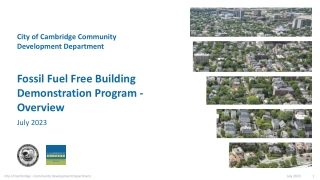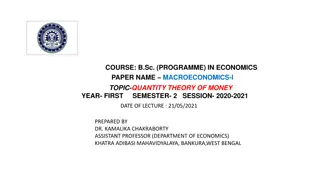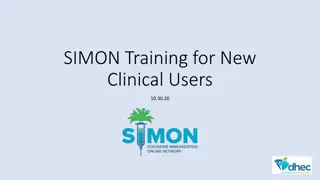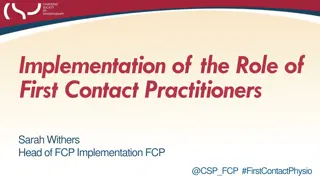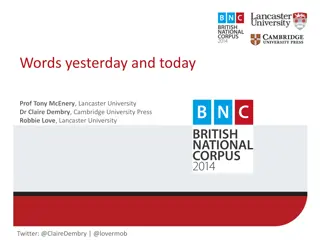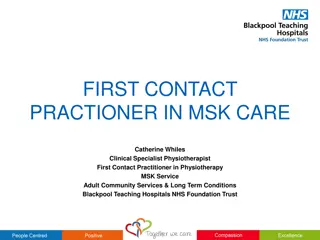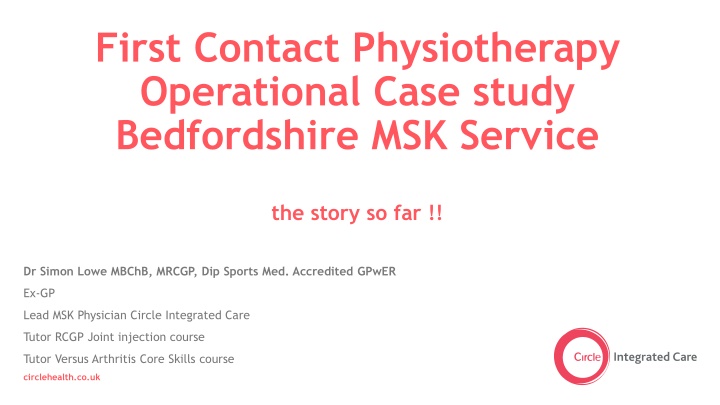
Improving MSK Services in Primary Care: Challenges and Solutions
Explore the need for enhancing musculoskeletal (MSK) services in primary care, focusing on the impact of MSK conditions on quality of life and the shift towards first contact physiotherapists. Discover the national agenda driving this change, challenges faced, and proposed solutions for optimizing MSK care delivery in healthcare settings.
Download Presentation

Please find below an Image/Link to download the presentation.
The content on the website is provided AS IS for your information and personal use only. It may not be sold, licensed, or shared on other websites without obtaining consent from the author. If you encounter any issues during the download, it is possible that the publisher has removed the file from their server.
You are allowed to download the files provided on this website for personal or commercial use, subject to the condition that they are used lawfully. All files are the property of their respective owners.
The content on the website is provided AS IS for your information and personal use only. It may not be sold, licensed, or shared on other websites without obtaining consent from the author.
E N D
Presentation Transcript
First Contact Physiotherapy Operational Case study Bedfordshire MSK Service the story so far !! Dr Simon Lowe MBChB, MRCGP, Dip Sports Med. Accredited GPwER Ex-GP Lead MSK Physician Circle Integrated Care Tutor RCGP Joint injection course Tutor Versus Arthritis Core Skills course circlehealth.co.uk
Why do we need to improve MSK services in Primary Care?
Quality of life is reduced more with an MSK problem than with any other long-term condition 0.9 0.79 0.68 LTCs (no MSK) MSK (no other LTCs) No LTCs Low back pain is commonest cause of Disability 11% - 2010 survey Quality of Life scores for GP Patient Survey respondents aged 45 and over, by type and composition of LTCs Reference: ARUK Musculoskeletal conditions and multimorbidity .
Reimbursement 70%/30% : 2019: Pharmacists and Social prescribers 2020: First Contact Physiotherapists, Physicians associates & Paramedics
Change in funding to 100% reimbursement Removal of contractual responsibility if scheme ceases Addition of 7 additional roles; Pharmacy technicians , Care coordinators, Health coaches ,Dieticians, Podiatrists & OT (mental health professionals from april 21) Funding 2020/21 100% 2020-21 7 FTE ave 344,00 2023/24 20FTE ave 1.13million Enable them to build up the workforce they need Different demographics may drive priorities in different areas
The National Agenda for FCP driven by.. 1 in 5 GP appointments involve MSK condition Massive Shortage of GP s Need to expand the Primary Care team FCP potentially gives speedier access to MSK assessment Access to physical activity advice Get It Right First Time Some of the challenges! Suggested 1 FCP per 10k population !!! Not currently enough specialised Physiotherapists to meet need Potential to create demand Where is the evidence that reduces GP workload Limited estates Lack GP focus
Introduction Physiotherapists providing a first point of contact service means that patients presenting with a musculoskeletal (MSK) problem for a GP appointment are offered an appointment with a physiotherapist instead. Physiotherapists working in general practice are able to address the needs of a large proportion of the patient population.(3) They have the clinical expertise and autonomy to assess, diagnose and treat patients with a range of conditions.
Need to demonstrate ? 1: Benefit to patient care 2: Reduced GP Workload
The role of the perfect FCP Aim : Improve patient pathway Shorter waiting times MSK and non-MSK Better consultations ! Resources , education events ,lifestyle interventions, mental health Identifying links with LTCs Reduce GP workload Consultations often for several things Avoid reviewing with GPs ( de-skilling GPs) Evidence based Ensuring FCP adequately trained eg: investigate appropriately Whose responsibility is the patient ? How do we prove benefit ? What criteria are we interested in ?
How do we ensure that providing FCP achieves aims? Proving that FCP reduces GP workload Questionnaires to patients Review outcomes ( subjective) GIRFT Avoiding duplication appropriate triage incl FCP Training needs of FCP Eg. rheumatology, CWP, imaging Creating links with GP and allied staff so that FCP is value added Driving the development of good MSK Care Becoming an enthusiastic and valued member of PHCT Training AHP minor illness , paramedics, physicians assistants MDT with GP complex cases where is the time ? Taking a role in PHE exercise agenda Pushing the value of lifestyle interventions PHE physical champion Patient education resources , events Recognising that seeing patients all the time is not necessarily best use of time
Bedfordshire MSK Service Experience Community Activity 2016/17 9 Community hubs 14 Secondary Care Providers 13 Community Therapy locations
Pilot Outcomes N= 447 Nov 2019- Bedfordshire FCP appointment outcomes
Bedfordshire MSK Service. What are we doing to promote FCP model ? contacting Clinical Directors /PCN Managers arrange meetings with CDs present proposal at Locality meetings Offer one to one meetings to discuss individual PCN needs and challenges
Current MSK pathway Patient presents in primary care GP/ Nurse appointment Advice Medications Time Referral or self referral to MSK service MSK Triage MSK specialist knowledge Physio MSK clinic Secondary care
Evolved MSK pathway Patient presents in primary care Receptionist screening training MSK specialist knowledge Other advanced practitioners eg nurse, paramedic First contact Physiotherapist GP Self referral training Self Education events Lifestyle interventions management resources Referral or self referral to MSK service Physio MSK service Secondary care
Thankyou Any Questions , comments

